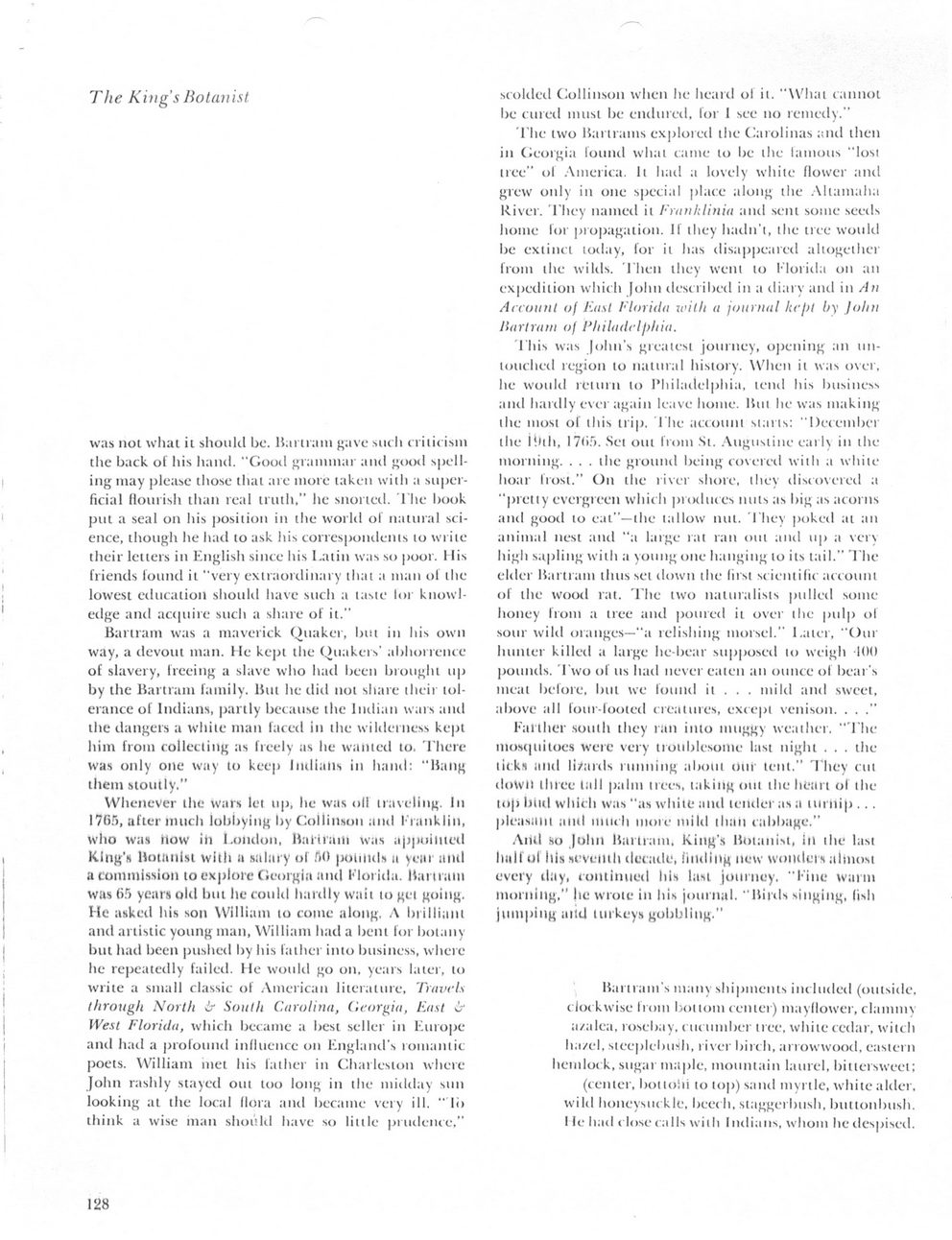This text was obtained via automated optical character recognition.
It has not been edited and may therefore contain several errors.
The King's Botanist was not what it should bo. Bartram gave such criticism the back of his hand. ?Good grammar and good spelling may please those that are more taken with a superficial flourish than real truth,? he snorted. The book put a seal on his position in the world of natural science, though he had to ask his correspondents to write their letters in English since his Latin was so poor. 11 is friends found it "very extraordinary that a man of the lowest education should have such a taste lor knowledge and acquire such a share of it.? Bartram was a maverick Quaker, but in his own way, a devout man. He kept the Quakers? abhorrence of slavery, freeing a slave who had been brought up by the Bartram family. But he did not share their tolerance of Indians, partly because the Indian wars and the dangers a while man faced in the wilderness kept him from collecting as freely as he wanted to, There was only one way to keep Indians in hand: "Hang them stoutly.? Whenever the wars lei up, he was oil traveling. In 176!>, after much lobbying by Collinson and Franklin, who was now iii Loudon, Baiiram was appointed King's Botanist with a salary of fiO pounds a year and a commission to explore Georgia and Florida. Hart ram was 65 years old but he could hardly wait to get going. He asked his son William to come along. A brilliant and artistic young man, William had a bent for botany but had been pushed by his father into business, where he repeatedly failed. He would go on, years later, to write a small classic of American literature, Travels through North ir South Carolina, Georgia, East o" West Florida, which became a best seller in Europe and had a profound influence oil England?s romantic poets. William met his father in Charleston where John rashly stayed out too long in the midday sun looking at the local flora and became very ill. ? li> think a wise man shot;Id have so little prudence,? scolded Collinson when he heard of it. "What cannot be cured must be endured, for I see no remedy.? The two Bartrams explored the Carolinas and then in Georgia found what came to be the laments "lost tree? of America, li had a lovely white flower and grew only in one special place along the Altamaha River. They named it Franklinia and sent some seeds home for propagation. If they hadn't, the tree would be extinct today, for it has disappeared altogether from the wilds. Then they went to Florida on an expedition which jolm described in a diary and in An Account of East Florida with a journal hej>t by John liartraiu of Philadelphia. This was John's greatest journey, opening an untouched region to natural history. When it was over, he would return to Philadelphia, tend his business and hardly ever again leave home. Hut he was making the most of this trip. The account starts: "December the i(tth, 17<?.r>. Set out from St. Augustine earh in the morning. . . . the ground being covered with a white hoar frost.? On the liver shore, they discovered a "pretty evergreen which produces nuts as big as acorns and good to eat??the tallow nut. They poked at an animal nest and ?a large rat ran out and up a very high sapling with a young one hanging to its tail." The elder Hartram thus set down the first scientific account of the wood rat. The two naturalists pulled some honey from a tree and poured it over (he pulp ol sour wild oranges??a relishing morsel." Later, "Our hunter killed a large he-bear supposed to weigh 100 pounds. Two of us had never eaten an ounce of bear?s meat before, but we found it . . . mild and sweet, above all four-footed creatures, except venison. . . Farther south they ran into muggy weather. "The mosquitoes were very troublesome last night . . . the licks and li/ards running about our tent.? They cut doWl) three (all palm trees, taking out the heart ol the top btnl which was ?as white and tender as a turnip .. . pleasant and much more mild than cabbage.? Anil So John Harlram, King's Botanist, in the Iasi half ui his seventh decade, finding new wonders almost every day, continued his last journey. "Fine warm morning,'' he wrote in his journal. "Birds singing, (ish jumping aiid turkeys gobbling." Bartram?s many shipments included (outside, clockwise from bottom center) mayllower, clammy a/alea, rosebay, cucumber tree, white cedar, witch ha/el, sieeplcbush, river birch, arrowwood, eastern hemlock, sugar maple, mountain laurel, bittersweet; (center, bottoiii to top) sand myrtle, white alder, wild honeysuckle, beech, staggerbush, buitonbush. I le had dose ca I Is with I ndians, whom he despised. 128

Bartram Smithsonian-article-re-John-Bartram-1977-p.8